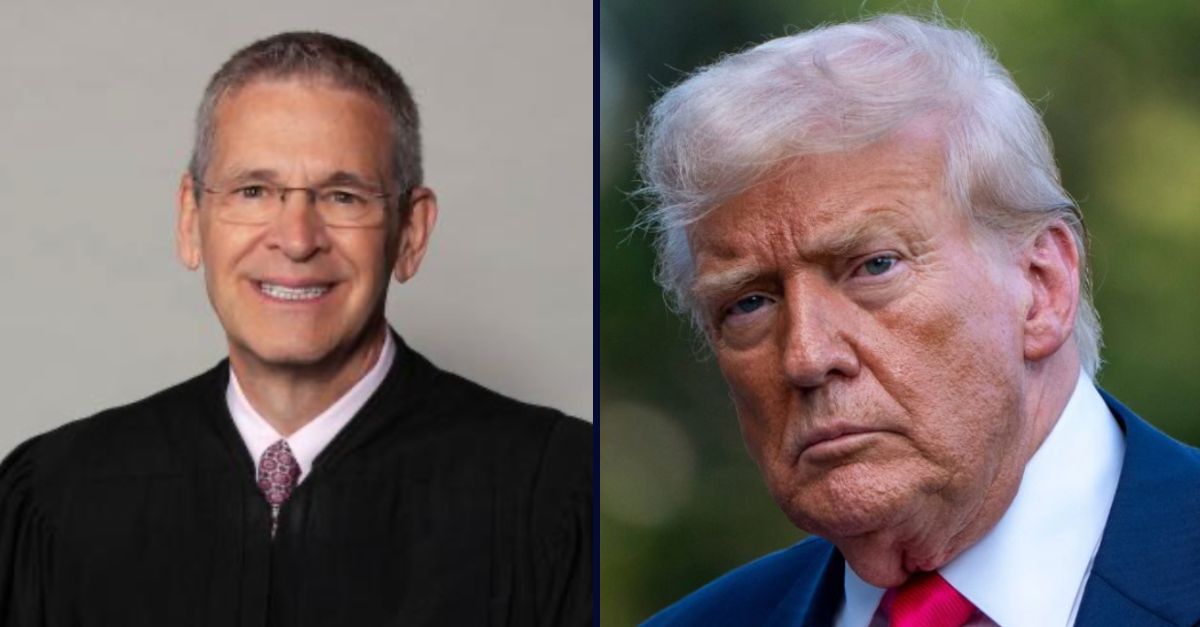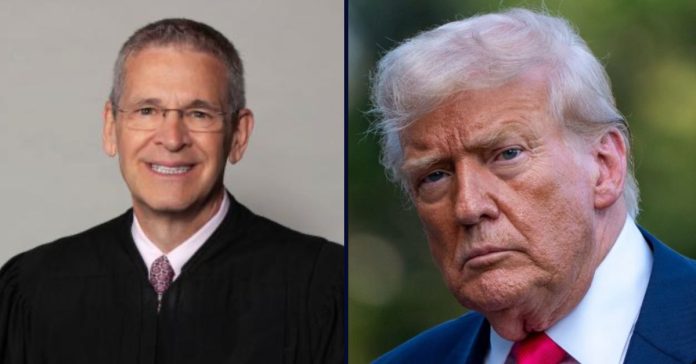
Left: U.S. District Judge John McConnell (U.S. District Court for the District of Rhode Island). Right: FILE – President Donald Trump walks from Marine One after arriving on the South Lawn of the White House, Tuesday, July 15, 2025, in Washington. (AP Photo/Alex Brandon, File).
One day after a Rhode Island federal judge ripped the Trump administration for failing to prevent Supplemental Nutrition Assistance Program (SNAP) benefits from lapsing “for the first time in our nation”s history” amid the government shutdown, impacting up 42 to million people, the DOJ filed emergency appellate documents throwing Congress under the bus and criticizing the jurist for making “a mockery of the separation of powers.”
The DOJ’s filing at the 1st Circuit U.S. Court of Appeals was the first volley in what would appear to be a busy Friday, as the appellate court immediately ordered the plaintiff coalition of churches, cities, nonprofits, a labor union, and grocery store to respond by noon.
The Trump administration, in an emergency motion for a stay pending appeal of U.S. District Judge John McConnell’s order to pay out SNAP benefits in full by Friday, began by dodging responsibility for a “crisis” of Congress’ making.
“Congress has failed to appropriate funds to pay for Supplemental Nutritional Assistance Program (‘SNAP’) benefits for this fiscal year,” the DOJ said. “Even after exhausting the entirety of the SNAP contingency reserve—a step that the Department of Agriculture (‘USDA’) took earlier this week in
response to a temporary restraining order issued by the district court— there is only enough money to pay partial November SNAP benefits.”
“This is a crisis, to be sure, but it is a crisis occasioned by congressional failure, and that can only be solved by congressional action,” the administration said, before levying a searing criticism of McConnell, a Barack Obama appointee, for claiming to have the power to order the government to fix the “SNAP shortfall” by diverting billions of dollars from school lunch funds in one day’s time.
Calling it an “unprecedented injunction makes a mockery of the separation of powers,” the DOJ asserted McConnell had “no lawful basis” to order the USDA to search its “metaphorical couch cushions” for hundreds of billions of pennies.
Love true crime? Sign up for our newsletter, The Law&Crime Docket, to get the latest real-life crime stories delivered right to your inbox.
Worse yet, the DOJ said, the judge claimed it was “arbitrary and capricious” of the government to “decline to raid school-lunch money to instead fund SNAP benefits,” framing that not as robbing Peter to pay Paul but “starv[ing] Peter to feed Paul, as it were.”
The DOJ also claimed that President Donald Trump’s social media post three days ago, in which he said SNAP benefits “will be given only when the Radical Left Democrats open up government, which they can easily do, and not before!” — despite McConnell’s contingency funding order — was “just stating a fact.”
“The district court also accused the President of bad faith for declaring that full SNAP benefits would not resume until the government reopens. But that was just stating a fact—the appropriation has lapsed, and it is up to Congress to solve this crisis,” the DOJ continued. “Unfortunately, the district court’s short-sighted injunction has thrust the Judiciary into the ongoing shutdown negotiations and may well have the effect of extending the lapse in appropriations, exacerbating the problem that the court was misguidedly trying to mitigate.”
The judge had given the government two options.
The first was to pay out this month’s allotments in full. The second option was to issue “partial payments” while working to “expeditiously resolve the administrative and clerical burdens” the USDA previously cited as a barrier to releasing reduced benefits.
The groups suing the Trump administration one week ago assigned blame to the executive for “needlessly” plunging SNAP into a “crisis,” arguing that there were billions of dollars in contingency funds for food stamps available.
Even more recently, the plaintiffs said the government “failed” to stop the crisis even on a partial basis.
Colin Kalmbacher contributed to this report.

